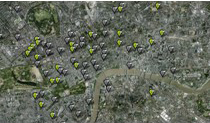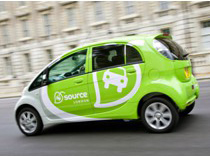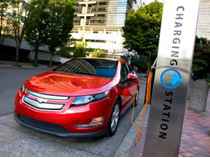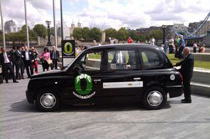
Source London, by Aldo Casciana |
 |
One of the great transformations which have changed London in recent years, as part of the Olympic programme is an ambitious programme launched by the Mayor of the city, Boris Johnson, always sensitive to transport sector issues, to make his city, a city of electric cars. It follows up on the programme Turning London Electric, promoted by London’s administration in 2009. Animated by a desire to reduce CO2 emissions by 2020, the programme Source London has started officially and will allow London to become the first “green capital” with 1,300 charge points for electric cars by the end of 2013.
According to the ambitious programme launched by the administration, the city must quickly revolutionize travel patterns in private transportation while at the same time stimulating the market for electric vehicles. The new electrical charge points would become a metropolitan network of eco-chargers. When complete the number of charge points will exceed the present number of petrol stations. As far as costs go, and consequently the savings promised by the programme, the owners of electric cars can charge their vehicles an unlimited number of times each year purchasing a card which would cost about 120 euro. Estimates of the reduction in CO2 emissions have been 40%. But the savings for those London drivers who sign up for Source London could be even more significant. Each would save an estimated £3,500 per year, thanks to the extension of the traffic tax on access to the centre (the London congestion charge) and of the road tax and this apart from the savings on the cost of fuel and maintenance of their vehicles.
It is estimated that there are about 2,100 electric vehicles in London today and almost 400 charge points which, according to the plan, should allow every Londoner to find a charge point at not more than half a kilometre from his or her home or workplace.
Following the launch of the programme, with Siemens as the main partner of Source London, many other companies have started making significant investments in the area of electric vehicles and new models are expected to hit the markets in a few months.
Mayor Johnson wants to spread the use electric vehicles and make London Europe’s centre for electric vehicle innovation. Recently he announced that he wanted to reach the ambitious target of 100,000 electric vehicles on London’s streets, without however, as some observers point out, specifying a time frame. One does however have to underline how, the great initial enthusiasm for the programme, which followed in the wake of the development programmes of Transport for London (the agency which has managed public transportation both above and below ground of Greater London since 2000), some have noted that the project has run into a sort of impasse. Though it was fed by the scenario of metropolitan transformation and improvement as they moved toward the upcoming Olympics, recently support from national politicians has lessened and there are other looming problems such as decreasing returns on investment.
Notwithstanding this, the plan to electrify the city continues, though problems have come up, including the recent urban rioting which irremediably damaged numerous charge points which had already been installed and were functioning.
In parallel with this is the programme to encourage the spread of electric vehicles. London’s administration continues to launch initiatives of high sustainability to make the upcoming Olympics the greenest ever. They have promised that there will be a fleet of taxis with zero emissions. Starting last March hydrogen fuel cells are being installed in some of the classic black cabs of the British metropolises. The taxis, built by a consortium including London Taxis International, TRW Conek and Lotus Engineering, have an autonomy of 400 kilometres and recharging their fuel cells takes 5 minutes. They should certainly contribute to making public transport more sustainable, in particular during the Olympics, exploiting the international exposure to advertise London as a benchmark of sustainability, as was planned by the city’s Mayor.




